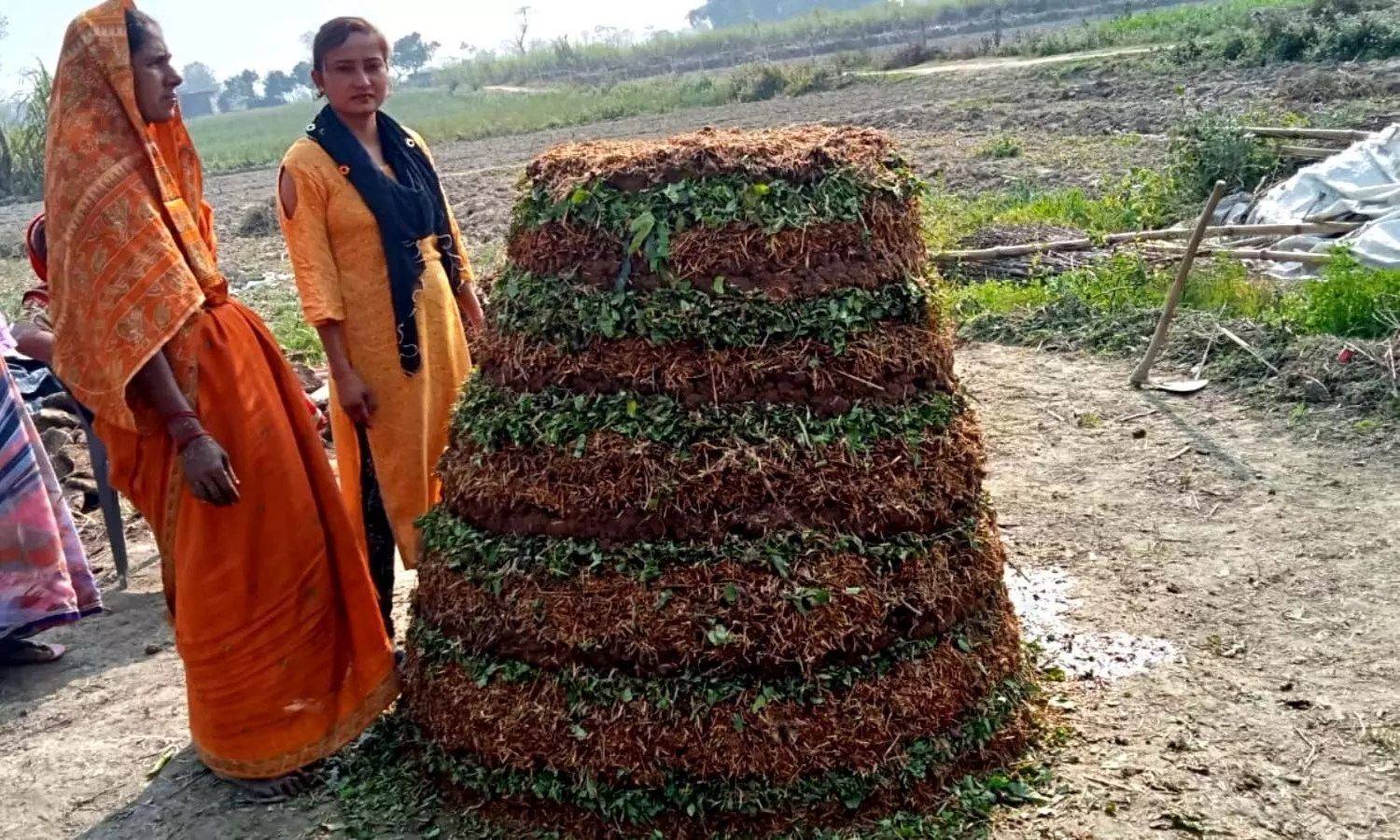Farmers in Bahraich, Uttar Pradesh adopt 'Berkeley compost' to grow vegetables
Under Uttar Pradesh State Rural Livelihood Mission, TRIF is training rural residents to make compost within 18 days using the Berkeley method. Women are using this compost to grow a variety of vegetables.
 Jyotsna Richhariya 10 Jun 2022 2:11 PM GMT
Jyotsna Richhariya 10 Jun 2022 2:11 PM GMT

Rural residents are being trained to make compost using the Berkeley method and use it in their fields to grow a variety of vegetables. All photos: Murari Jha, Consultant, TRIF.
Seema's one acre farmland is lush green even in peak summer season with a range of organic vegetables growing on it. It's been over nine months that the 33-year-old community worker from Urra village in Mihinpurwa block of Bahraich district of Uttar Pradesh started making compost at home.
"We were trained with demonstrations of the compost making process, which I further improved upon at my house and have also trained some other women of the village. I now grow vegetables like ivy gourd and lady finger using my own compost," Seems told Gaon Connection.
And it is no ordinary compost that Seema and other women of Urra village are making and using in their fields. They have been trained to make Berkeley compost. As the name suggests, the method of Berkeley compost has been developed by the US-based University of California, Berkeley. Transform Rural India Foundation (TRIF), a grassroot non-profit organisation, has introduced this method under the Uttar Pradesh State Rural Livelihood Mission in a block of Bahraich district in the state.
Rural residents are being trained to make compost using the Berkeley method and use it in their fields to grow a variety of vegetables. So far, around 150 women from Cluster-Level Federation and farmers have received training under this project.
"Making compost through the Berkeley method is labour intensive and initially we found it difficult. It also requires us to collect dry and green waste in large quantities. But with training and guidance, we are now adept at it," said Seema.
How to make Berkeley Compost
Berkeley compost is a three layer process which includes a bottom layer of biodegradable dry waste, a second layer of green waste mostly green leaves or grass, and an upper layer of cow dung. These layers are repeated in a round shape for five to eight times one over the other to create a small tower like structure. The proportion ratio of 3:2:1 is followed for the respective three layers.
A family makes the Berkeley compost in Bahraich, Uttar Pradesh.
Each step requires the sprinkling of water to maintain the moisture level in the compost. After the structure is ready, it is covered with a plastic sheet. The Berkeley method takes only 18 days to get the compost ready for use.
"Berkeley method is a warm method of developing compost, unlike the non-scientific method where the biodegradable waste is collected in no definite proportion in the open to change into the compost. The old methods usually take six to eight months to produce usable compost," informed Mansoor Naqvi, Programme Manager, Bahraich, TRIF.
"Another advantage of Berkeley compost is that it can be prepared in large amount, six to eight times in a year, since it takes only eighteen days to get ready and requirement of cow dung is one sixth of the total raw materials. Since half of the raw material required is dry matter collected from the vicinity, it can also be seen as a waste-management strategy and not just as soil sustainability intervention," he added.
Berkeley compost covered with plastic sheet to keep it warm.
The quality of the Berkeley compost is assessed on the parameters of its colour, dampness, temperature and smell. "I believe we are still in the trial phase. In order to understand the real impact of this compost, we will have to test the results at least after three years," Naqvi said.
Pilot Testing of the Berkeley Compost
To assess the benefits of Berkeley compost, farmers are already testing it in their fields. Ramavati, a farmer from Urra village of Bahraich district, divided her field of ivy gourd in two parts. She used Berkeley compost in one and regular fertilisers in the other.
"Harvest with Berkeley compost was greener and the plants taller in height as compared to the other half of the field, and within the same duration of time," Ramavati told Gaon Connection.
Also Read: 'Mahila Mates' and Asmita app raise women's participation under MGNREGA in Sonbhadra
Challenges being addressed
This technique of preparing Berkeley compost is labour intensive as it demands human resources to turn the structure of compost on every alternate day after the initial four days till it is ready in 18 days, said the farmers.
In summers, green fodder is not available in abundance, which has to be fed into the compost making process. Similarly, in the rainy season, it is difficult to find dry waste, and there is a need to protect the compost from rainwater.
People in Bahraich district with prepared structure of compost.
Mira Kumari is a 32-year-old farmer from Urra village in Bahraich district who prepared Berkeley compost in January this year. "There is a shortage of green fodder in summers and hence I am unable to create the compost again," she told Gaon Connection.
However, farmers feel the benefits of Berkeley compost far outweigh the challenges due to its timeliness and cost-effectiveness. "We have also initiated training of this method in the districts of Aligarh, Banaras, Mirzapur, Chandauli, Lakhimpur Kheri and Basti," Naqvi told Gaon Connection.
This story has been done as part of a collaboration with Transform Rural Indian Foundation.
#story #farming #uttarpradesh #WomenEmpowerment
More Stories




